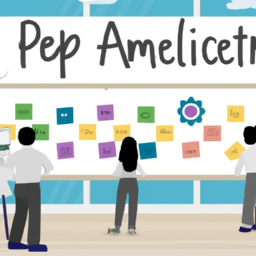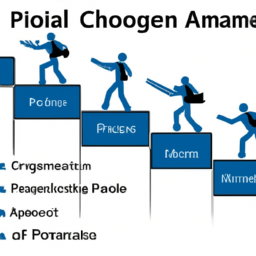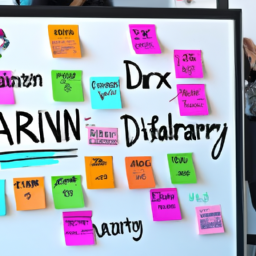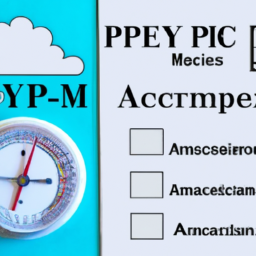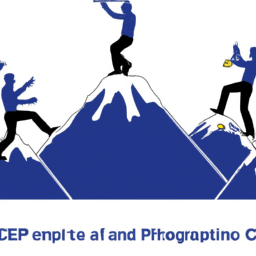Are you preparing for the PMI ACP exam? Well, buckle up because this article is here to guide you through 10 common mistakes to avoid.
Imagine this: you’ve invested countless hours into studying, only to find out you neglected to review the PMI ACP Exam Outline and Content Outline. Don’t let that happen to you!
With our expert tips and strategies, you’ll be fully equipped to conquer the exam and achieve success.
So let’s dive in and ensure you’re well-prepared for the PMI ACP exam journey.
Key Takeaways
- Familiarize yourself with agile principles and practices, including the agile methodology overview and the importance of an agile mindset.
- Gain a solid understanding of the PMI ACP exam domains, such as agile principles and methodologies, stakeholder engagement, and team performance.
- Avoid misconceptions about the exam domains by going beyond surface-level understanding and focusing on the agile mindset and values, as well as agile methodologies and frameworks.
- Allocate sufficient preparation and study time by employing effective time management strategies, creating a study schedule, using active learning techniques, practicing with sample questions, and regularly reviewing notes.
Lack of Familiarity With Agile Principles and Practices
You need to make sure you’re familiar with agile principles and practices to avoid making this common mistake on the PMI ACP exam. Having an understanding of agile methodology overview and the importance of an agile mindset is crucial for success in the exam.
Agile methodology is a project management approach that emphasizes flexibility, collaboration, and continuous improvement. It promotes adaptive planning, evolutionary development, and early delivery. By being familiar with agile principles, such as customer collaboration, self-organizing teams, and responding to change, you will be able to answer questions related to agile practices and techniques confidently.
Understanding the agile mindset is equally important as it helps you to think and approach problems in an agile way. This includes embracing change, valuing feedback, and focusing on delivering customer value. By having a strong foundation in agile principles and practices, you will be well-prepared for the PMI ACP exam and increase your chances of success.
Now, let’s discuss another common mistake to avoid on the PMI ACP exam – insufficient understanding of the PMI ACP exam domains.
Insufficient Understanding of the PMI ACP Exam Domains
When preparing for the PMI ACP exam, it’s crucial to have a solid understanding of the exam domains. One common challenge that test takers face is domain knowledge gaps.
These gaps can lead to misconceptions about the exam domains, which can ultimately result in lower exam scores. In this discussion, we will explore the importance of addressing domain knowledge gaps and dispelling exam domain misconceptions to increase your chances of success on the PMI ACP exam.
Domain Knowledge Gaps
One common mistake to avoid in the PMI-ACP exam is not having enough domain knowledge. Knowledge gaps can hinder your ability to answer questions accurately and effectively.
It is crucial to have a solid understanding of the different domains covered in the exam, such as agile principles and methodologies, stakeholder engagement, and team performance.
Many aspirants have misconceptions about the level of depth required for each domain. They might assume that a surface-level understanding is sufficient, but in reality, the exam demands a thorough comprehension of each domain and its underlying concepts.
To avoid this mistake, make sure to invest enough time and effort in studying and filling any knowledge gaps you may have. Focus on understanding the nuances and intricacies of each domain to boost your chances of success in the PMI-ACP exam.
Exam Domain Misconceptions
To truly understand the different domains covered in the PMI-ACP exam, it’s important to realize that misconceptions about the required depth of knowledge can be detrimental to your success.
Many candidates make the mistake of assuming that a surface-level understanding of Agile principles and practices will be enough to pass the exam. However, the reality is that the exam delves deep into each domain, testing your ability to apply Agile concepts in various scenarios.
One common misconception is that the exam focuses solely on project management aspects, neglecting the importance of Agile mindset and values. Another mistake is underestimating the significance of the different Agile methodologies and frameworks, such as Scrum, Kanban, and Lean.
Understanding these misconceptions and avoiding these common mistakes will greatly increase your chances of passing the PMI-ACP exam.
Inadequate Preparation and Study Time
When it comes to preparing for the PMI ACP exam, time management is key.
To ensure you make the most of your study time, it is important to utilize effective study techniques that work for you.
Time Management Tips
Are you struggling with managing your time effectively during the PMI ACP exam? Time management is crucial when it comes to successfully completing the exam. To ensure you make the most of your study time, it is important to implement effective time management strategies and study methods.
One strategy is to create a study schedule that allocates specific time slots for studying each topic. This will help you stay organized and ensure that you cover all the necessary material.
Additionally, using effective study methods such as active learning, practicing with sample questions, and reviewing your notes regularly can help you retain information more efficiently.
Effective Study Techniques
Using effective study techniques can greatly enhance your learning experience and improve your chances of success in any exam. Here are three study techniques that will help you tackle your exams with confidence:
-
Active retrieval: Instead of passively reading through your notes or textbooks, actively engage with the material by quizzing yourself or explaining concepts to someone else. This technique strengthens your memory and comprehension.
-
Spaced repetition: Instead of cramming all your studying into one session, break it up into smaller, spaced-out study sessions over a longer period of time. This allows information to be consolidated in your long-term memory, leading to better retention.
-
Practice with past exams: Familiarize yourself with the format and types of questions that may appear on the exam by practicing with past exams. This not only helps you become comfortable with the exam structure but also allows you to identify any knowledge gaps and work on them.
Avoiding Last-Minute Cramming
To avoid last-minute cramming and reduce stress, make sure you give yourself enough time to study and review the material thoroughly. Last-minute strategies are often ineffective and can lead to feelings of overwhelm and panic. Instead, it is important to establish effective study habits early on.
Begin by creating a study schedule that allows for consistent and regular review of the material. Break down the content into manageable chunks and allocate specific time slots for each topic. This will help you stay organized and focused.
Additionally, use active learning techniques such as summarizing information in your own words, creating flashcards, and teaching the material to someone else. These strategies will enhance your understanding and retention of the material, making it easier to recall during the exam.
Failure to Utilize Mock Exams and Practice Questions
You should definitely take advantage of mock exams and practice questions to avoid failing the PMI ACP exam. These tools provide numerous benefits and advantages that can greatly enhance your chances of success. Here are three reasons why you should make use of mock exams and practice questions:
-
Realistic Simulation: Mock exams closely resemble the actual PMI ACP exam, allowing you to experience the format, time constraints, and question types. This helps you become familiar with the exam environment, reducing anxiety and boosting your confidence.
-
Identification of Weak Areas: By attempting practice questions and taking mock exams, you can identify your areas of weakness. This enables you to focus on those areas during your study and improve your overall understanding of the exam content.
-
Time Management Skills: Mock exams and practice questions help you develop effective time management skills. By practicing under timed conditions, you learn to allocate your time wisely and complete the exam within the given time frame.
Neglecting to Review the PMI ACP Exam Outline and Content Outline
When preparing for the PMI ACP exam, it is crucial to pay attention to the exam outline and content outline. Understanding the exam outline will give you a clear understanding of the topics that will be covered in the exam, allowing you to focus your preparation accordingly.
Neglecting to review the exam and content outline can have serious consequences, as you may end up studying irrelevant or insufficient material, leading to lower chances of success in the exam.
Exam Outline Importance
The exam outline’s importance cannot be overstated. It serves as a roadmap for your studying journey, providing structure and guidance. Here are three reasons why the exam outline is crucial to your success:
-
Organization: The exam outline outlines the topics and subtopics that will be covered in the PMI ACP exam. By understanding the organization of the exam, you can effectively plan your study schedule and allocate your time and resources accordingly.
-
Studying Techniques: The exam outline also helps you identify the key areas that require more focus and attention. By aligning your studying techniques with the outline, such as using flashcards or practicing mock exams, you can optimize your learning and retention of the material.
-
Confidence Boost: By familiarizing yourself with the exam outline, you will gain confidence in your knowledge and preparedness. This confidence will not only reduce exam anxiety but also increase your chances of performing well on the actual exam.
Understanding the importance of the exam outline sets the stage for the next step: reviewing the content outline in detail.
Content Outline Review
Take a moment to review the content outline and familiarize yourself with the topics and subtopics that will be covered in the exam. It is crucial to understand the content organization as it will help you navigate through the exam more efficiently.
The content outline serves as a roadmap, guiding you through the different areas of knowledge that will be tested. By reviewing it beforehand, you can identify any gaps in your understanding and focus your study efforts accordingly.
Additionally, effective note taking is key during the exam. As you review the content outline, make sure to jot down important points, key concepts, and any specific details that you might need to remember. This will not only help you during the exam but also serve as a valuable reference for future study sessions.
Neglected Preparation Consequences
Now that you have reviewed the content outline for the PMI-ACP exam, it is crucial to understand the consequences of neglecting preparation. Failing to adequately prepare for this exam can have severe drawbacks. Here are three key consequences you should be aware of:
-
Increased stress and anxiety: Without proper preparation, you may find yourself feeling overwhelmed and anxious during the exam. This can negatively impact your ability to think clearly and answer questions accurately.
-
Poor performance: Neglecting preparation can lead to a lack of understanding of key concepts and techniques. As a result, your performance in the exam may suffer, potentially resulting in a lower score than you had hoped for.
-
Wasted time and money: The PMI-ACP exam is not cheap, and neglecting preparation can lead to failure, requiring you to retake the exam and spend additional time and money on registration fees.
Overlooking the Importance of Agile Tools and Techniques
Don’t underestimate the significance of agile tools and techniques in the PMI ACP exam. Understanding the importance of agile tools and the significance of agile techniques is crucial for success in this exam.
Agile tools are essential in managing and tracking project progress, facilitating collaboration, and ensuring efficient communication among team members. These tools enable project managers to adapt and respond quickly to changes, a key aspect of agile project management.
On the other hand, agile techniques provide a structured approach to managing projects, ensuring that teams can deliver high-quality products on time and within budget. Familiarity with agile tools and techniques will not only help you answer exam questions accurately but will also equip you with practical skills that can be applied in real-world project management scenarios.
Ineffective Time Management During the Exam
Ensure you effectively manage your time during the exam to maximize your chances of success. Time management strategies and effective exam techniques are crucial for achieving a high score. Here are three key tips to help you make the most of your exam time:
-
Prioritize: Identify the questions that are worth the most points and tackle those first. This way, you can ensure you allocate your time wisely and focus on the questions that will have the biggest impact on your overall score.
-
Pace Yourself: Don’t rush through the exam, but also don’t spend too much time on a single question. Set a pace that allows you to answer each question thoroughly while still leaving time for review.
-
Use Time Saving Techniques: Learn and practice techniques such as skipping difficult questions and coming back to them later, utilizing process of elimination to narrow down options, and quickly scanning the question before reading the entire answer choices.
By implementing these time management strategies and effective exam techniques, you can improve your performance and increase your chances of success.
Transitioning to the subsequent section, it’s important to note that relying solely on work experience instead of proper exam preparation can be a costly mistake.
Relying Solely on Work Experience Instead of Exam Preparation
Relying solely on work experience without proper exam preparation can lead to suboptimal results. While work experience is valuable, it has its limitations when it comes to the PMI-ACP exam.
This exam requires a comprehensive understanding of agile principles, tools, and techniques, which may not be covered in your day-to-day work. Exam preparation is of utmost importance to fill these gaps and ensure success.
By dedicating time to studying the exam syllabus, practicing sample questions, and familiarizing yourself with the exam format, you can greatly improve your chances of passing the PMI-ACP exam.
Don’t underestimate the importance of exam preparation, as it provides you with the necessary knowledge and confidence to tackle the exam effectively.
Poorly Managing Stress and Anxiety During the Exam
Managing stress and anxiety during the exam is crucial for optimal performance. It’s normal to feel nervous before a big test, but with the right strategies, you can effectively manage test anxiety and cope with exam stress. Here are three key tips to help you stay calm and focused:
-
Deep Breathing: Take slow, deep breaths to activate your body’s relaxation response. Inhale deeply through your nose, hold for a few seconds, and exhale slowly through your mouth. Repeat this technique whenever you start feeling overwhelmed.
-
Positive Self-Talk: Replace negative thoughts with positive affirmations. Remind yourself that you have prepared well and are capable of handling the exam. Encourage yourself with words like ‘I can do this’ and ‘I am well-prepared.’
-
Time Management: Plan your study schedule in advance and allocate time for breaks. Break down your study material into smaller, manageable chunks. This will help prevent last-minute cramming and reduce stress.
Underestimating the Significance of Agile Manifesto and Values
Don’t underestimate the significance of the Agile Manifesto and its values; they provide a foundation for effective project management.
The Agile manifesto importance lies in its ability to guide teams towards successful project delivery. The manifesto’s values, such as customer collaboration, responding to change, and delivering working software, are the core principles that drive Agile methodologies.
By embracing these values, project managers can ensure that their teams prioritize customer satisfaction, adapt to changing requirements, and produce tangible results. The Agile values’ significance cannot be overstated, as they promote transparency, collaboration, and continuous improvement within project teams.
Agile methodologies have revolutionized the software development industry, and understanding and implementing the Agile Manifesto and its values are essential for any project manager seeking success in the dynamic and fast-paced world of project management.
Frequently Asked Questions
How Can I Familiarize Myself With Agile Principles and Practices Before Taking the PMI ACP Exam?
To familiarize yourself with agile principles and practices before taking the PMI ACP exam, start by gaining an agile principles overview.
Understand the core values and principles of agile methodology, such as customer collaboration and responding to change.
Then, explore the benefits of agile practices, such as increased flexibility and faster delivery.
What Are Some Effective Study Techniques to Ensure a Sufficient Understanding of the PMI ACP Exam Domains?
To ensure a sufficient understanding of the PMI ACP exam domains, there are several effective study techniques you can employ.
Start by creating a study schedule that allows for regular and consistent review of the material.
Break the domains down into manageable chunks and focus on one at a time.
Utilize flashcards, practice exams, and online resources to reinforce your knowledge.
Additionally, collaborate with fellow students or join study groups to gain different perspectives and insights.
With these techniques, you’ll be well-prepared for the exam.
Are There Any Specific Strategies or Tips for Effectively Utilizing Mock Exams and Practice Questions in Exam Preparation?
To effectively utilize mock exams and practice questions in your PMI ACP exam preparation, it is essential to understand their benefits and the importance they hold.
Mock exams provide you with a simulated experience of the actual exam and help you assess your readiness.
Practice questions allow you to familiarize yourself with the exam format and identify areas of improvement.
What Are the Key Components of the PMI ACP Exam Outline and How Can I Review Them Effectively?
To effectively review the key components of the PMI ACP exam outline, start by understanding the exam content. Familiarize yourself with agile principles, methodologies, and tools.
Then, create a study plan that covers each topic thoroughly. Use review techniques such as flashcards, practice quizzes, and mind maps to reinforce your knowledge.
Additionally, seek out study materials and resources that align with the exam outline to ensure you are adequately prepared.
How Can I Incorporate Agile Tools and Techniques Into My Exam Preparation to Better Understand Their Importance?
To better understand the importance of agile tools and techniques for the PMI ACP exam, it is essential to incorporate real-world applications and case studies. This allows us to explore how these tools and techniques are utilized in different industries and project scenarios. By doing so, we can gain a deeper understanding of their effectiveness and practicality.
This approach enhances exam preparation by providing practical examples and enables us to apply agile methodologies with confidence in both the exam and real-life project management scenarios.
Conclusion
Congratulations on completing the article on common mistakes to avoid in the PMI ACP exam!
By now, you should have a clear understanding of the pitfalls to steer clear of during your preparation and exam.
Remember, it’s crucial to familiarize yourself with agile principles, allocate enough study time, and utilize mock exams.
Don’t neglect the PMI ACP exam outline and content outline, and manage your time effectively during the exam.
Lastly, don’t underestimate the significance of the Agile Manifesto and values.
Good luck on your journey to success!

